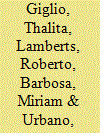| Srl | Item |
| 1 |
ID:
125500


|
|
|
|
|
| Publication |
2013.
|
| Summary/Abstract |
In discussions on smart grids, it is often stated that residential end-users will play a more active role in the management of electric power supply and demand. They are expected to shift from a passive role as consumer of electricity to an active role as co-provider. In this article, the extent to which current technologies, products and services empower end-users to take up an active role as co-providers is evaluated. Based on a review of literature and related pilot projects, current approaches were found to be driven by technical and financial considerations. There appears to be a lack of product and service design that supports end-users in their role as co-providers in a smart grid. This is reflected in the lack of thought given to how the end-users' process of behavioral change can be supported to enable the transition from consumer to co-provider. Several recommendations are provided for product and service designers towards fostering the role of co-provider, which comes under under: (a) user interaction needs, (b) approaches to behavioral change and (c) community initiatives and management of resources. Designers are considered to play a bridging role between policy making and engineering, while facilitating involvement of end-users in the design process.
|
|
|
|
|
|
|
|
|
|
|
|
|
|
|
|
| 2 |
ID:
132596


|
|
|
|
|
| Publication |
2014.
|
| Summary/Abstract |
Due to government subsidies, Brazil has witnessed an increase in the installation and use of small solar water heating systems in low-income housing projects. Although the initiative has reduced the load curve during peak times due to the reduced use of electric showerheads, measurement and verification (M&V) are needed to validate the savings. M&V procedures should take into account the social and economic variability of low-income housing developments. To improve M&V in low-income housing projects, this paper presents a methodology for identifying homogeneous subgroups based on their energy-saving potential. This research strategy involved a cluster analysis designed to improve the understanding of what energy savers and other influencing factors exist. A case study in Londrina Brazil was undertaken with 200 low-income families. Five clusters, created based on savings potential, were defined. The results showed that only two clusters demonstrated good electricity savings, representing 47% of families. However, two clusters, or 37%, did not provide satisfactory savings, and the other 16% did not provide any consumption history due to previous use of illegal city electricity connection practices. Therefore, studies confirm the need for a detailed measurement of the representative subgroups to assess the influence of human behaviour on potential SWHS-induced savings.
|
|
|
|
|
|
|
|
|
|
|
|
|
|
|
|